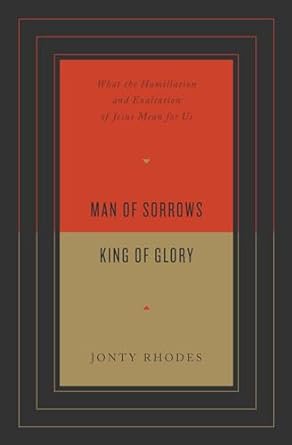My first book review for 2024 is for a book I picked up a year ago from an advertisement I saw while scrolling through Facebook. I was unfamiliar with the book and the author, but the title was so captivating that I bought the book. The book is called “Man of Sorrows King of Glory” by Jonty Rhodes.

The book explores the meaning of Jesus’ humiliation and exaltation. Humiliation refers to Jesus’ life from the incarnation to the cross and exaltation from the resurrection to the present. Rhodes examines these two states of Christ (humiliation and exaltation) through the three offices of Christ: prophet, priest, and king. He explains why this topic is vital in the opening chapters, “It is not just that Jesus was our Savior; he remains so today.” The author is concerned that when believers only focus on the work of Christ in the past, this creates burdened pastors and guilt-laden sheep. Although the role of pastors is important, pastors are not the savior, and people who place too much hope in their pastors will eventually feel disappointed.
Rhodes begins the book by looking at the person of Christ before looking at his work. I appreciate that the author was clear and precise in his words. For example, he looked at Christ’s person and natures. Jesus is one person but has two natures. Jesus was truly God and truly man. One then has to think about how Jesus did not know certain things if he was truly God. One example Rhodes uses is when Jesus said he did not know the date of his second coming (Matt 24:36). The answer he gives is that in his human nature, Jesus didn’t know, but according to his divine nature, he knew the answer. He was also careful to say that the person of Jesus is the Son of God, but he acts in two different natures. He said, “No, there’s only one person, and natures don’t do anything-only persons act.” Although this sounds like hairsplitting, he states that the importance is seen in the work of Christ. Jesus had to be one of us (human) to die as a representative in our place. Also, if Jesus was not fully God, he could not earn the right of salvation for us.
This led to the book’s first part on the humiliation of Christ and his work in his life and death. He talks about Jesus’ work in two ways: his active and passive obedience. I like how he explained the two, “Jesus’s active obedience is the term given to his fulfilling of the law for us. Ever since Adam fell in the garden, we’ve needed a rescuer to do two things: remove our debt of sin and also live the obedient life that Adam (and we in him) failed to live. Someone needs not only to bear the curse but also to fulfill all righteousness.” Early in my Christian life, the pastors I listened to often emphasized Jesus dying on the cross on our behalf, while his living an obedient life was seldom spoken of. This made me think I had to be obedient to keep God’s favor, or I would face his displeasure. The obedience of Christ on our behalf leads not to lawless living but rather a different kind of obedience, grateful obedience. I want to please God as my Father, not fear his displeasure as my judge. His active obedience is a topic that I think needs more emphasis as it helps keep Jesus as the focus of our lives instead of looking to our performance for God.
The second part of the book explored Jesus in his exhalation. I enjoyed this part of the book because it emphasized Jesus and his ongoing work on behalf of believers. The importance of that is in what he said, “At its worst, a neglect of Christ’s ongoing work can shift the focus to us ministering for Jesus, rather than Jesus ministering to us.” He talks about the mercy and compassion of Christ. He talks about Christ’s priestly work, intercessing on behalf of believers. His payment on the cross was enough for present sins, so believers do not need to fear. He borrows from Thomas Goodwin, “Your very sins move him to pity more than anger. “ He said, “And Jesus’s sympathy toward our weaknesses includes our weakness of sin. It is because of sin that we need mercy and grace, after all!” If we were sinless after we became believers, the intercessory work of Jesus would be unnecessary. We would also give ourselves glory instead of depending on Christ for help. One of the most powerful quotes regarding this was from Robert Murray M’Cheyne, “If I could hear Christ praying for me in the next room, I would not fear a million enemies. Yet distance makes no difference. He is praying for me.”
I enjoyed reading this book and found that it caused me to praise Jesus again for all He has done, continues to do, and promises to do in the future. I recommend this book if you want to have your heart pointed back to Christ and be reminded of his love for you. His humiliation and exaltation are truths that help remind us of Jesus’ work both in the past and present. There is so much good news in understanding how Jesus is our prophet, priest, and king!